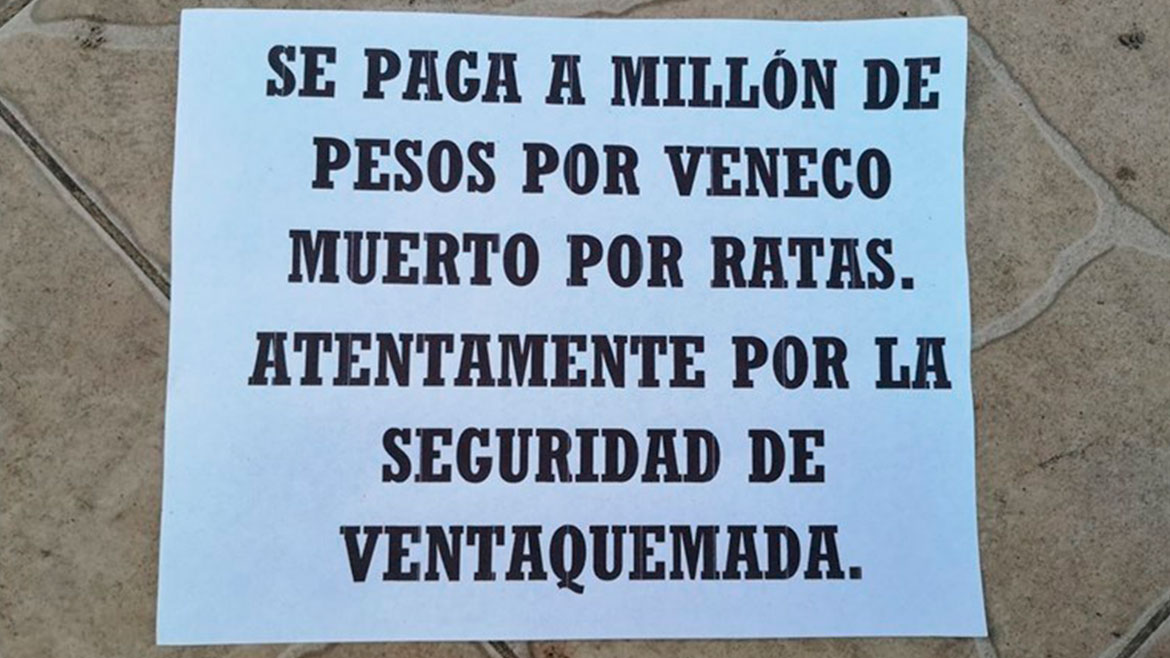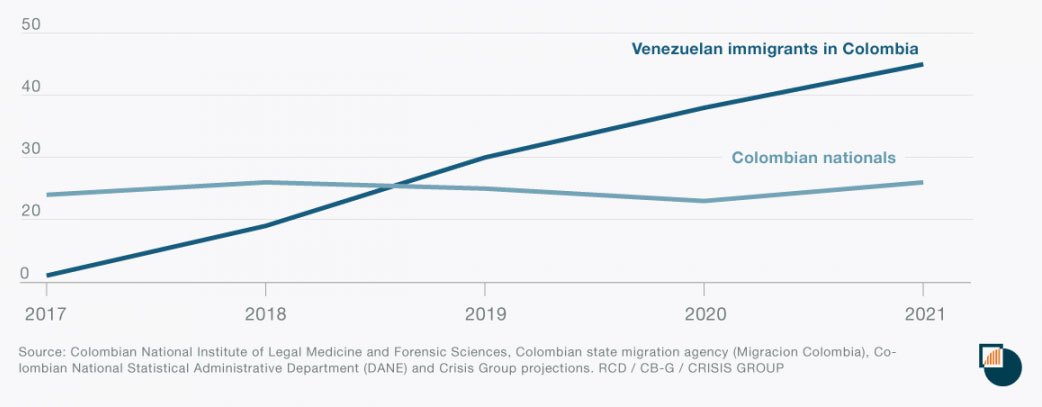Venezuela’s diaspora in Colombia is exposed to major threats that are left unaddressed by government authorities, according to the International Crisis Group (ICG).
In a report, ICG exposed the dire human rights situation of the 2.5 million Venezuelans who have migrated to Colombia over the past decade.
Colombia’s previous governments have done more than any other to deal with the unprecedented mass exodus of Venezuelans, the NGO stressed.
However, these efforts have not been sufficient to effectively protect migrants against threats posed by poverty, illegal armed groups and xenophobia.
More than half of Venezuela’s refugees in Colombia at risk of starvation: UN
How bad is the situation?
Venezuelans make up almost 5% of Colombia’s population, according to statistics provided by the country’s migration agency, which says that 96% of the migrants have been formally registered.
Notwithstanding, an estimated 16% of Colombia’s homeless population is Venezuelan and many of the migrants describe their living conditions as “miserable and inhumane.”
Many poorer Venezuelans end up in informal accommodation or pay-per-day rooms, called “pagadiarios,” … commonly described by their inhabitants as miserable and inhumane.
International Crisis Group
The unemployment rate among Venezuelans migrants was 24% last year while the general unemployment rate was 13.7%, according to statistics agency DANE.
An estimated 90% of working immigrants are employed informally, which particularly affects women who earn 26.5% less than men, according to a 2019 survey.
Predatory employers are fueling xenophobia and tensions between workers, the ICG warned.
“When Venezuelans do get work, but at lower pay rates, they can find themselves at odds with the Colombian work force.” according to the report.
In the construction industry, for example, a Colombian employee can earn up to 70,000 Colombian pesos ($17.5) a day, while a Venezuelan is paid about 30,000 pesos ($7.5), even if he is similarly skilled.
International Crisis Group
As a result of their precarious labor situation, 64% of Venezuelan migrants in Colombia lack food security and 14% were malnourished, according to the United Nations’ World Food Program.
Venezuelans in Colombia
Illegal armed groups
Illegal armed groups are taking advantage of Venezuelans’ vulnerability either by extorting them as they try to enter Colombia or recruiting them as “disposable” members.
This is particularly an issue in the border region where illegal armed groups are particularly active.
Armed groups “show they are different to the government, which does not lend a hand”, an expert in child recruitment said. Even though guerrilla outfits such as the ELN do not pay their soldiers a salary, fake offers are made to recruit Venezuelans, or gifts are distributed such as cell phones or even motorbikes. In Arauca, one of its traditional bastions, the guerrilla group allegedly pays one-off signup fees of between 200,000 and 500,000 Colombian pesos ($50 to $125).
International Crisis Group
The ICG found that illegal armed groups recruit migrants under threat and in some cases seek to lure migrants to join them through online advertising in Venezuela.
In the capital Bogota, gangs target homeless Venezuelans or team up with motel owners.
“Indebted migrants are induced to consume drugs, creating a dependency relationship with criminal groups. Fake charities offer shelter but reportedly insert migrants in networks of sexual exploitation and micro-trafficking, according to ICG.
The chief of an enterprise of contract killers (known as sicarios) in Colombia explained that he now mainly works with Venezuelans due to the lower costs. “A Colombian asks for 10 million pesos ($2,500) to kill someone; a Venezuelan does it for two or three million ($500-750).”
International Crisis Group
Venezuelan gang members “can be killed to prevent him or her from acquiring power or status within the group,” according to ICG.
“They are disposable,” a Bogota gang leader said, claiming that Venezuelans “can be removed and they can be replaced.”
In the countryside, Venezuelans are drawn into illegal economies like illegal mining or the harvesting of coca, the base ingredient of cocaine, that are controlled by illegal armed groups.
The pay for migrants who work in the gold mines tends to vary. Some Venezuelans working in a region controlled by paramilitary groups said they are paid about 40 per cent less than Colombians if they lack formal residency, but at equal rates to Colombians if they have valid papers. In another area, controlled by the ELN, a woman who had trouble finding a job in Bogotá and proceeded to work in the sex industry in Antioquia told Crisis Group that she now earns a few hundred U.S. dollars a month in an illegal gold mine.
International Crisis Group
A significant number of migrants has become a victim of Colombia’s armed conflict, but cannot register with the National Victims Unit, which would allow them to receive support meant for them, according to ICG.
Homicide rate among Venezuelan immigrants
Women particularly vulnerable
Venezuelan women and girls are particularly vulnerable as they are targeted by organized crime networks engaged in human trafficking and forced prostitution.
This poses a threat to women and girls who want to cross the border and those who have already settled in Colombia.
Some Venezuelan women are forced into sex work after arriving in Colombia, often winding up in clandestine brothels where they are exploited and abused.
International Crisis Group
“One migrant mentioned a house inhabited by about 25 women, including five minors” in the border city Cucuta “who had been marked behind their ears to prove ‘ownership’,” said the ICG.
Young women and girls – sometimes underage – are also escorted to rural areas to be wed in servile marriages to coca growers, with some men ostensibly “buying” them from armed groups or human traffickers. Women and girls are abused and beaten if they are caught attempting to escape. Local authorities allegedly do not act even when they harbor suspicions about landowners engaging in child marriage.
International Crisis Group
According to ICG, the women are particularly vulnerable because of corruption by law enforcement officials and the ineffectiveness of Colombia’s judicial system.
In Bogota and Cucuta, police have been accused of working with human traffickers.
Of the 908 human trafficking cases reported between 2011 and 2016, only 52 ended in convictions, said ICG.
ICG investigator Bram Ebus told Colombia Reports that a lack of data makes it impossible to estimate how many Venezuelan women and children have fallen victim to sexual violence.
Colombia’s failing state | Part 4: The border with Venezuela
The xenophobic backlash
The little data that exists appears to suggest that Venezuelan immigrants are less involved in violent crime than Colombian citizens.
Xenophobic comments made by government officials like Bogota Mayor Claudia Lopez, arbitrary policing and unhinged xenophobia on social media have created a different impression, particularly in the capital.
Migrants say the conspicuous role played by Venezuelans in carrying out street crime for Colombian groups leads the entire community to be stigmatized and treated with suspicion. Migrants, above all in the capital, report being subjected to regular abuse by police officers, who beat them and destroy their identity documents.
International Crisis Group
The ethnic tensions caused by the mass migration have fueled aggression and violence against Venezuelans, and has reduced public support for the government’s migration policy.
Colombia shocked over execution of 12-year-old ‘shoplifter’
How to respond?
The ICG stressed that the migration policies of Colombia’s previous governments have been considerably more generous than those of any other country.
The government must also facilitate Venezuelan migrants’ access to Colombia’s formal economy to prevent them against exploitation and involvement in illegal activity.
President Gustavo Petro’s promise to reestablish ties with the Venezuelan government that were cut in 2019 would also greatly improve the situation of immigrants, according to ICG.
A safer life for Venezuelans in Colombia will … depend on improving ties between the two countries.
International Crisis Group
Ultimately, a solution to Colombia’s migration crisis depends on the success of negotiations between the Venezuelan government and its opposition to end the political crisis in the neighboring country.




